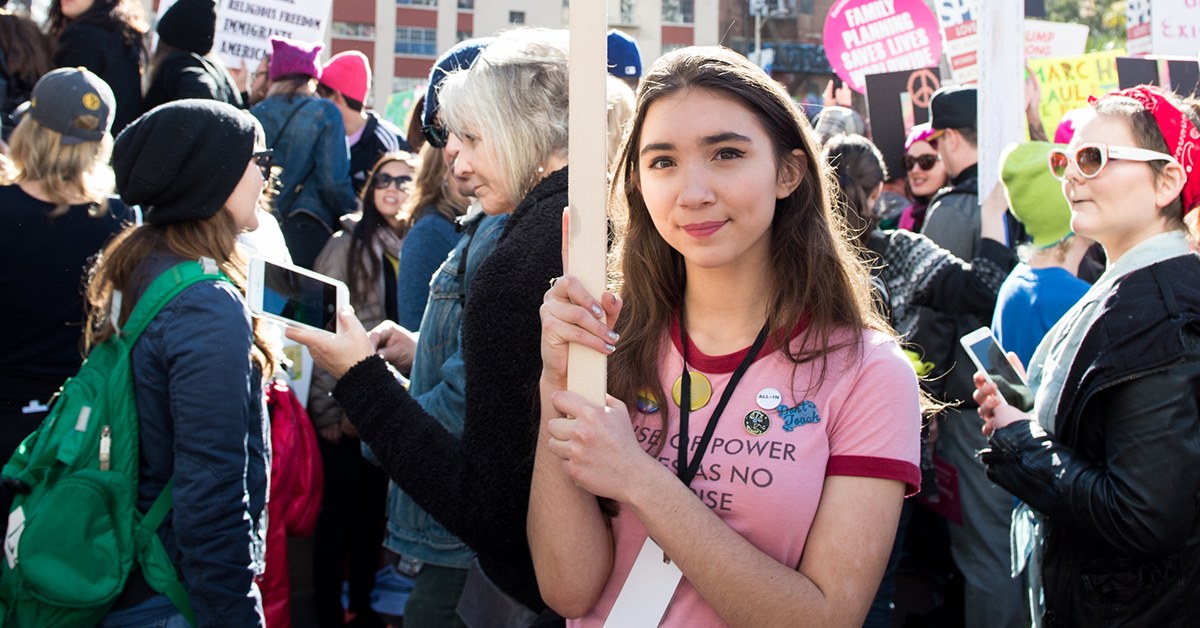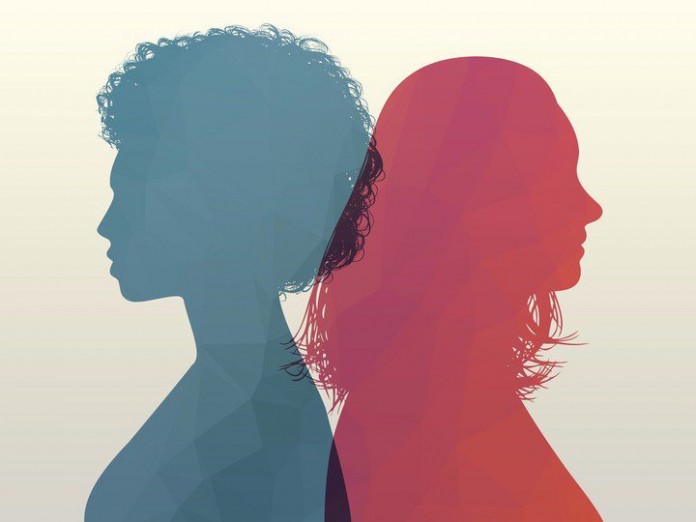Rowan Blanchard Gets Real About Intersectional Activism After the Women’s March
teenvogue.com - The Women's March on Washington truly became a national, and international, movement, with hundreds of thousands of people marching across the United States and around the world in support of women's rights. In downtown Los Angeles alone, 750,000 people marched and one of those was actress and activist Rowan Blanchard, who took to the podium after marching to address the crowd. And though she regularly educates and informs her millions of followers on social media, there’s something about addressing almost a million faces IRL that would probably spook anyone just a little bit — but not Rowan. Although she began her speech by addressing the initial despair she felt after Donald Trump’s election win, she then eloquently explained why she won’t let fear impede her work as an activist in these next four years. “I believe in art,” Rowan told the crowd after reading a passage on hope from a Rebecca Solnit text, “but more than that, I believe in the ineffable power of community.” She went on to note that the strength of marginalized communities is what teaches us that organizing works: “If women, if queer people, if people of color have survived this long in a world that refuses to represent them, that must amount to a force much greater than one man with nothing more to invest in but his ego.” Make no mistake: Her speech is definitely a must-watch.
Investing in Intersectionality
We talk a lot about investing in women, but one issue that is often neglected—or not even identified—in discussions about gender equality is intersectionality. First coined by Kimberlé Crenshaw, intersectionality is the idea that different systems of oppression interact. Basically, different types of oppression come as a package deal for an individual facing them. For example, white women face many obstacles and disadvantages compared with men, but black women face marginalization from both racial and gender-based discrimination—and are therefore likely to be disadvantaged even more than white women. Intersectionality acknowledges both the fact that traits like sex, gender, race, nationality, disability, orientation, class, age and other factors all affect a person's opportunities or obstacles in life; as well as the fact that discrimination happens through the combination of and relationship between these various identities, and the systems that oppress individuals belonging to them.
While we're talking about getting more women on boards and in the C-Suite, while we're advocating for women and girls around the world, and while we're celebrating women's successes every day; it's important to remember that women's empowerment is not a one-size-fits-all endeavor—and our discussions, as well as our investments, need to reflect that.
As soon as you start looking for examples, intersections become obvious. From the challenge black women face in the tech industry, to the high violence rates faced by aboriginal women or transgender women (and particularly transgender women of color), to the poverty and class stagnation faced by women from lower-class backgrounds; women's rights are tied to so many other rights.
Think of it this way: The problem of women's disenfranchisement around the world, from boardrooms and venture capital to politics and social movements, has been a failure of inclusion. Does it really make sense, now, to turn a blind eye to the inclusion of people of different races, orientations, nations, religions, beliefs, ages, abilities or other categories? In addition to a moral failure, we fail to consistently combat the root of the problem as it's existed for women for millennia. Inclusion needs to be intentional, and it needs to be intersectional.
As with anything, access to capital and education is crucial in the fight for equality, and that goes double (or triple, or more) for women facing enforced status quos, discrimination, cultural obstacles and more.
That's why we try to stay vigilant to fight for and celebrate women—of all kinds, in all places, facing all situations—at Women Investing in Women Digital. We plan to discuss specific investing and entrepreneurship opportunities as they relate to intersectionality and various communities in the near future, and we thank you for adding your own diverse voices to our growing conversation, and if you'd like to learn more about just a few intersectional efforts, see below for just a few intersectional organizations you might want to follow and support.
Investing in Intersectionality
Digital Undivided: An accelerator and outreach program supporting startups led by black and Latina women.
Women Enabled International: An advocacy and education group promoting and protecting the rights of all women and girls, especially those with disabilities.
GLAAD: A communications hub, media outreach effort, support network and more promoting understanding and rights for all LGBTQ individuals, including women.
Women's Refugee Commission: An international organization working to protect and empower refugee women and girls.
American Civil Liberties Union: A nonprofit organization that uses lobbying, education and the law to defend poor people, individuals from marginalized communities, minorities facing harassment, women facing gender-based violence or discrimination, women seeking reproductive health care and many more. They also fight for equal economic opportunities for women.
Disability Visibility Project: An online community dedicated to "recording, amplifying and sharing disability stories and culture."
Asian Women in Business: A nonprofit organization supporting Asian women entrepreneurs and professionals.
A Challenge to Emma Watson (and All Feminists): Learn about Challenges for Women with Disabilities
Actress, activist and UN Women Goodwill Ambassador Emma Watson has long had our admiration for her moving speech at UN Headquarters in New York City to launch HeForShe, but it's perhaps even more admirable that she's learning feminism and activism as she goes--just like all of us--and is allowing fans to come with her on the journey. To that end, she announced last month that she will take a year off from acting for "personal development, including learning more about women's issues and advocating for women around the world. Because feminism includes the rights of all women some, like Sarah Blahovec writing for The Huffington Post, are urging Watson and other feminists to learn more about disability rights. Continue reading for more information, and for resources to learn even more.
huffingtonpost.com - Last week, actress and feminist powerhouse Emma Watson made waves in the media after announcing that she would be taking a year off of acting for “personal development” and to promote gender equality around the world. As somebody who grew up during the Harry Potter generation (the books spanned my childhood, and I graduated high school right before the final movie was released), I was one of the many girls that had Hermione Granger as a fictional role model in my life. Emma Watson is now one of the more visible and very admirable young feminist role models due to her work with the United Nations on promoting the HeforShe Campaign. And while she is taking on the challenge of promoting women’s equality around the world, I still see some room for growth in her feminism on something that is missing from most women’s (even intersectional) feminism. While examining intersections of race and class are starting to make a buzz (but still have very, VERY far to go), very few feminists know about the specific obstacles to equality for women with disabilities.
Read more here.
Is Merriam-Webster adding “Intersectionality” to its dictionary?
We think intersectionality--recognition that different forms of oppression and discrimination overlap and intersect--is crucial to any modern movement for women's empowerment. In the decades since the word was coined, it's only become more important. That's why we were so happy to see Merriam-Webster may soon be adding the word to its dictionary. blavity.com - The term [intersectionality] coined in 1989 by Kimberlé Crenshaw was used to culminate and understand the effects of all forms of oppression (racism, sexism, classism) on an individual, specifically black women.
INTERSECTIONALITY—THE COMPLEX, CUMULATIVE MANNER IN WHICH THE EFFECTS OF DIFFERENT FORMS OF DISCRIMINATION COMBINE, OVERLAP, OR INTERSECT
Nearly 30 years after Crenshaw’s essay that pushed the envelope on feminist theory, the term has become prevalent in daily discourse and of course the Twitter debates that we’ve all had ringside seats to on various occasions. And now that Merriam-Webster says the term is on its “words we’re watching list” soon all you’ll have to say is, “Check the dictionary, beloved.”
The term 'intersectionality' was coined in a 1989 essay by legal scholar Kimberlé Crenshaw: https://t.co/2fu3nhJE0i pic.twitter.com/1wTJuDMjnc
— Merriam-Webster (@MerriamWebster) February 23, 2016
Read more from Blavity here.








